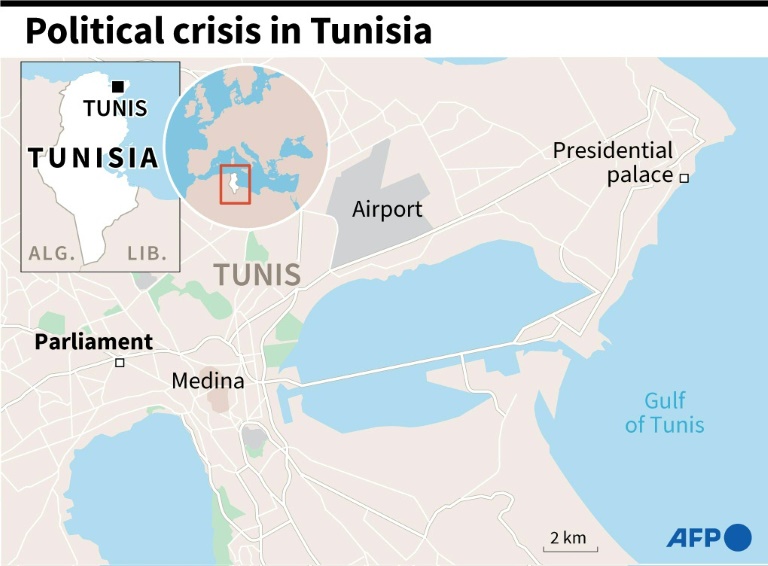
Tunisian security officers hold back protesters outside the parliament building in the capital Tunis on July 26 © AFP / FETHI BELAID
Tunis (AFP), Jul 25 – Tunisian President Kais Saied sacked the defence minister Monday, a day after ousting the prime minister and suspending parliament, plunging the young democracy into constitutional crisis in the midst of a pandemic.
Street clashes erupted Monday outside the army-barricaded parliament, after Saied dismissed Prime Minister Hichem Mechichi and ordered parliament closed for 30 days, a move the biggest political party Ennahdha decried as a “coup”.
Mechichi said he would hand power to the man chosen by the president, in his first comments since the shock move.
Saied declared on Sunday he had “taken the necessary decisions to save Tunisia, the state and the Tunisian people,” following street protests in multiple cities against the government’s handling of the Covid pandemic in the North African country.
The president, who under the constitution controls the armed forces, warned his opponents against taking up arms, threatening that if anyone “fires a single bullet, our forces will respond with a rain of bullets”.
On Monday afternoon, the presidency announced the dismissals of Defence Minister Ibrahim Bartaji and Hasna Ben Slimane, the acting justice minister.

Tunisian President Kais Saied, on the left, and Ennahdha Islamist party founder Rached Ghannouchi © AFP/File / FETHI BELAID, Eric PIERMONT
Soldiers from early Monday blockaded the assembly in Tunis while Saied backers hurled stones, bottles and insults at supporters of the Islamist-inspired Ennahdha, whose leader was barred entry to the complex.
Troops also surrounded the office of Mechichi.
Later in the afternoon, the protests died down, with the presidency extending an overnight curfew in place to combat the coronavirus and banning gatherings of more than three people.
– ‘Very dangerous’ –

Map of Tunis, where clashes broke out on Monday in front of the parliament following its suspension by President Kais Saied and the dismissal of the prime minister. © AFP / Vincent LEFAI
Saied’s dramatic move — a decade on from Tunisia’s 2011 revolution, often held up as the Arab Spring’s sole success story — comes even though the constitution enshrines a parliamentary democracy.
It “is a coup d’etat against the revolution and against the constitution,” said Ennahdha, the lead party in Tunisia’s fractious ruling coalition, warning its members “will defend the revolution”.
The powerful Tunisian General Labour Union (UGTT) which played a key role in the 2011 uprising, said the president had acted “in accordance” with the constitution to “prevent imminent danger and to restore the normal functioning” of the state.
US Secretary of State Antony Blinken on Monday spoke by telephone with the Tunisian president asking him to respect democracy and “maintain open dialogue with all political actors and the Tunisian people,” the State Department said.
The European Union appealed to people to respect the “rule of law” and to “avoid any resort to violence” while former colonial ruler France urged a speedy return to “normal functioning” of the government.
Russia said it was monitoring the situation, while Turkey, where the government supports Ennahdha, called for “democratic legitimacy” to be restored.
The crisis follows months of deadlock between the president, the premier and Ennahdha chief Rached Ghannouchi, which has crippled the Covid response, as deaths have surged to one of the world’s highest per capita rates.
More than 18,000 people have died of coronavirus in a nation of 12 million.

A supporter of the Ennahda party stems his wound from a stone thrown during a protest outside the parliament building in Tunis on Monday © AFP / FETHI BELAID
Police also shuttered the local bureau of Qatari-based Al Jazeera television, the network’s Tunis director Lotfi Hajji said, warning that “what is happening is very dangerous, it is proof that freedom of the press is threatened”.
Media organisation Reporters Without Borders condemned the move, while Amnesty International called it a “deeply worrying precedent signalling that human rights are in danger”.
Saied’s power-grab sparked jubilant rallies late Sunday by supporters who flooded the streets of Tunis, waving the national flag and sounding their car horns as fireworks lit up the sky.
– ‘Birth of a dictator’ –

Tunisian soldiers cordon off the parliament, which was suspended by President Kais Saied on Sunday, prompting allegations of a “coup” © AFP / FETHI BELAID
Since Saied was elected in 2019, he has been locked in a showdown with Mechichi and Ghannouchi, who is also house speaker.
The rivalry has blocked ministerial appointments and diverted resources from tackling Tunisia’s many economic and social problems.
Saied said he would assume executive power “with the help” of a government whose new chief he would appoint himself.
Analysts said it was not clear what would happen next. “We are in the unknown,” said Michael Ayari, from the International Crisis Group.

Tunisian President Kais Saied is greeted by supporters late Sunday after he ousted the prime minister and ordered parliament closed © Tunisian presidency Facebook page/AFP
In the 10 years since Tunisia’s popular revolution toppled dictator Zine El Abidine Ben Ali, Tunisia has had nine governments.
Some have lasted just months, hindering the reforms needed to revamp the country’s struggling economy and poor public services.
Sunday’s drama began with mass protests against the government for its failures in tackling the pandemic.
A senior Ennahdha official, speaking to AFP on condition of anonymity, alleged that the protests and subsequent celebrations were choreographed by Saied.
After Saied’s announcement, one jubilant supporter, Nahla, hailed the president’s “courageous decisions”.
But one man in his forties looked on without enthusiasm.
“These fools are celebrating the birth of a new dictator,” he said.
About The Author










































